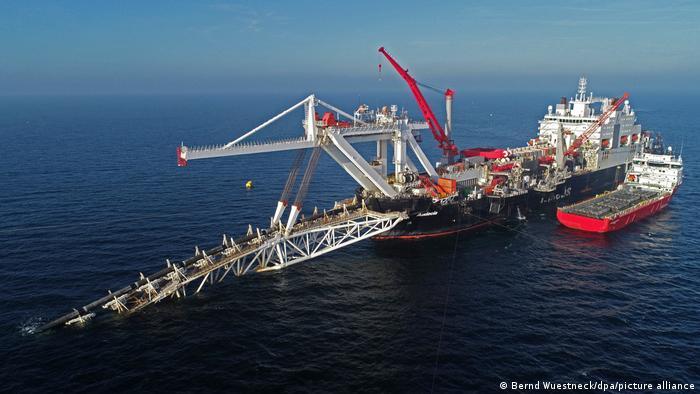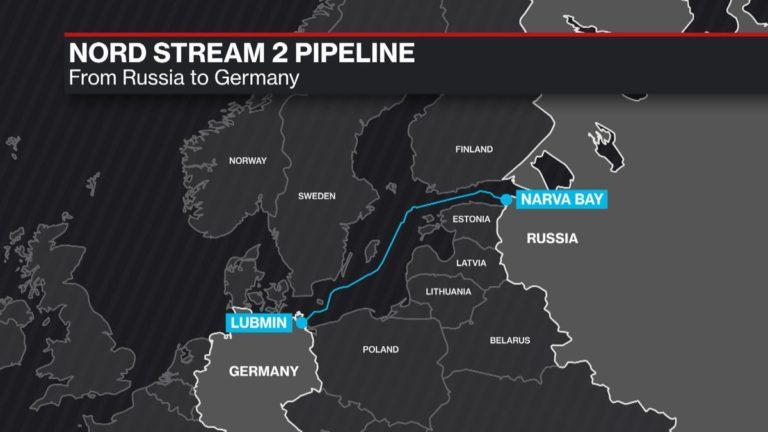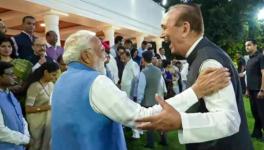US-German Nord Stream 2 Gas Pipeline Deal has Third Partner

The undersea Nord Stream 2 gas pipeline is nearly complete
The joint statement issued in Washington and Berlin on Wednesday signifies that the two countries have struck a compromise deal over the controversial Nord Stream 2 gas pipeline.
Both the US and Germany were eager to simmer down the controversy. For President Joe Biden, the controversy stood in the way of reviving the transatlantic partnership with Germany, while for Chancellor Angela Merkel, Nord Stream 2 is a proud legacy of her 16 years in power.
However, what is overlooked is that there is also a third party to Wednesday’s compromise deal — Russian President Vladimir Putin, who can be described as the ‘guarantor’ of the deal. Typically, Putin shies away from publicity, and these are not exactly happy times in ‘East-West’ relations. Or else, ideally, this could have been a historic photo-op for Biden and Merkel with Putin.
The ‘back-to-back’ deal carefully worked out between Merkel and Putin beforehand came into view Wednesday evening when Merkel had a call with Putin to touch base with him for one more time. The Kremlin readout of their conversation says Putin ‘noted Germany’s consistent commitment to implementing this project, which is strictly a commercial venture and is designed to enhance energy security of Germany and the rest of the EU.’
In plain terms, Putin complimented Merkel and assured her once again that Moscow would treat the Nord Stream 2 ‘strictly’ as a commercial venture of mutual benefit. The readout signalled that Merkel took Putin into confidence regarding her talks with Biden at the White House recently during her ‘official working visit’.
Russia wouldn’t like the Nord Stream 2 project to be explicitly linked to Moscow’s agreement with Kiev to continue to use Ukrainian territory for transportation of gas to Europe via the Soviet era pipelines. The readout nonetheless acknowledged that Putin also discussed with Merkel ‘the opportunity to extend the agreement’ with Kiev beyond the existing timeline of 2024.
Without doubt, this is the corner stone of Wednesday’s deal. The Kremlin readout is carefully worded to hint at Russia’s constructive approach apropos Merkel’s commitment to Biden that Ukraine will continue to be a beneficiary of Russian gas supplies and transit fee beyond 2024.
Call this an ‘assurance’ or ‘guarantee’ or ‘understanding’ or whatever, but Putin has put in place the necessary underpinning for Wednesday’s deal. This is also an incredible feat of Russian diplomacy. Moscow achieves three things here.
First, Putin’s willingness to extend the agreement beyond 2024 with Ukraine is a gesture to Merkel personally for ending the controversy over Nord Stream 2 while she is still Germany’s chancellor. Putin is also aware of Germany’s predicament vis-a-vis Ukraine, which of course is not in Russia’s interests, as Berlin remains a sobering influence on Kiev for keeping the Minsk Agreements alive.
Second, the Russian assurance at the highest level as regards the upcoming negotiation of the agreement between Gazprom and Naftogaz Ukraine becomes a confidence-building measure regionally insofar as Russia’s strategic interests lie in strengthening its profile and credentials as a reliable source of energy.
In fact, a window of opportunity is open for Russia to continue supplying gas to Poland what with Denmark’s latest decision to withdraw a permit for the Danish section of the Baltic Pipe gas pipeline from Poland to Norway, which Warsaw was banking on to shift away from dependence on Russian gas. read more
Equally, Russia’s constructive approach to helping Ukraine enhances its image in the European perceptions. This could have fallouts not only for future gas contract negotiations with Europe but also on Moscow’s ambitious plan of construction of an energy bridge linking any future nuclear production in the Russian exclave of Kaliningrad with the EU electricity market.
Third, the gas supplies from Russia and the transit fee Kiev earns annually from Gazprom is vital for Ukraine’s economy. Washington keeps talking about Ukraine’s so-called energy transition (switch to renewable energy, development of hydrogen, increased energy efficiency, weaning away from coal, carbon neutrality, etc.) but that is a long haul and the regime’s record on reform in general doesn’t inspire confidence.
In political terms, therefore, Putin takes the long view that Ukraine will ultimately see the merits of friendly partnership with Russia, given the realities of geography and history. And in the Russian toolbox, energy is a valuable asset to develop relations with Ukraine.
The US-German Nord Stream 2 deal commits Berlin to sanction Russia if it tries to use energy supplies for gaining geopolitical leverage, but that is a hypothetical scenario. Germany has also agreed to make investments in Ukraine’s energy sector and to actively ensure that Moscow and Kiev extend the gas transit agreement. Additionally, Germany would invest $1 billion (€0.85 billion) in a “Green Fund” to foster Ukrainian green-tech infrastructure, encompassing renewable energy and related industries, with the goal of improving Ukraine’s energy independence.

Washington will no longer stand in the way of the Nord Stream 2 pipeline. The Biden Administration apparently calculated that it is simply counterproductive to significantly undermine or weaken the US’ relations with Germany over a project that has already been completed despite sustained pressure from Washington. Washington may have factored in that even after the upcoming Bundestag election, the opposition to Nord Stream 2 within Germany being a minority opinion, no future government in Berlin would go back on it.
Above all, the US may have even salvaged some victory by getting Germany to fall in line with the EU’s consensus on energy security and in future, refrain from leaving the European path on energy relations with Russia. But this is for the future, and the fact is, Germany is a powerhouse and more than half a superpower, and it is increasingly assertive.
Fundamentally, however, there is a contradiction. Pipelines have a history of realigning strategic relationships. The echoes of a distant past will be resonating here. Chancellor Willy Brandt resisted the US pressure to go ahead with the energy pipeline from the former Soviet Union (1973) and, in a historical perspective, his visionary Ostpolitik opened the pathway for detente — and arguably, resulted in German unification!
The Nord Stream 2 too is destined to transform German-Russian relationship and the US will have to learn to live with it. The catch here is that the US’ failure to kill Nord Stream 2 calls attention to its waning influence over Germany. Any strengthening and consolidation of German-Russian partnership due to the dense energy ties would put the US at further disadvantage.
The state department official who briefed the media said, “Our joint statement (Wednesday’s) sends a clear message that the United States and Germany will not tolerate Russia using energy as a geopolitical weapon in Europe or escalating its aggression against Ukraine. We’re committed to working together with our allies and partners to impose significant costs on Russia, including in the areas of sanctions and energy flows, if it engages in these malign activities.” read more
Despite Wednesday’s deal, there remains strong bipartisan opposition to the pipeline in the US Congress, as well as in Ukraine and Poland. Clearly, the US will not take its eyes off the German-Russian relationship and will keep butting in to make sure it doesn’t flourish too much to its liking.
Nord Stream 2 will overshadow US-German relations for years. Merkel’s absence beyond September, when she retires, will be keenly felt in Moscow. Merkel has consistently played a key role in trans-Atlantic relations between Europe and the US. She has also been the West’s principal interlocutor with the Kremlin — and with Putin personally.
Get the latest reports & analysis with people's perspective on Protests, movements & deep analytical videos, discussions of the current affairs in your Telegram app. Subscribe to NewsClick's Telegram channel & get Real-Time updates on stories, as they get published on our website.
























